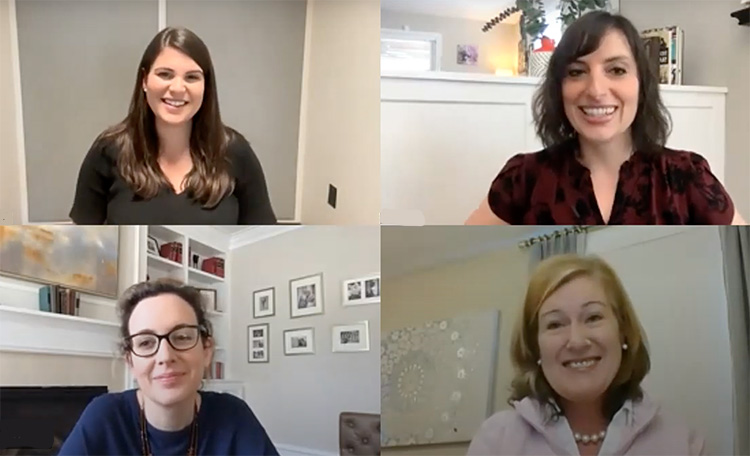Four Women at the Intersection of National Security and Media Share Their Experiences for Women’s History Month

On March 15, Scalia Law’s National Security Institute hosted an online event, “Front and Center: NatSec Women in Media,” focused on the role of gender in national security. The speakers included four women, Tal Kopan; Heather Molino; Sarah Isgur; and Lauren Claffey Tomlinson, who have forged successful careers combining media and national security, a traditionally all-male field that is slowly becoming more gender-inclusive.
In today’s reality, we find women playing significant roles in the intersection of national security, cybersecurity, and media. This marks a sharp contrast to the previous generation, when the first wave of women in the field were on their own and couldn’t help each other. Heather Molino — who has over two decades of Capitol Hill and communications experience, as well as a decade in broadcast journalism, and is now principal in the cyber and National Security practice at Cornerstone — recalled coming into a meeting of staff directors in 2010 and being the only woman in the room – “no minorities, just a bunch of white men.”
The pioneers may have done all the heavy lifting, but advancing in the workspace nowadays still means dealing with sexism. As put by Lauren Claffey Tomlinson, former Deputy Assistant Secretary for Public Affairs at the Department of Homeland Security and now President of Claffey Communications, and expecting her second child, it just is “more nuanced than it used to be.” “There still are different types of discrimination that we need to be clear about. What we are doing now is fine-tuning, navigating that unconscious bias.”
For Sarah Isgur, — political commentator at The Dispatch, podcast host of Advisory Opinions, and former spokesperson for the Department of Justice — when it comes to hiring, women are less likely to be selected, just because men are more likely to think of men for the positions. This happens because “there are simply fewer women at the that top echelon.” And “it's a fact of life that men are more friends with men, as women are more friends with women. That is not sexism, that is reality,” she added.
“The unfortunate reality is we still have to be more prepared, more credible and more professional than our male counterparts in order to succeed. But we will mentor the next generation below us and they’ll have to do one less step than we did,” summarized Claffey Tomlinson.
As the conversation moved to their roles as mentors to younger women, Isgur recalled one of her male bosses teaching her not to say “I think.” “When he asked me “how much is that budgeted,” I would be, ‘I think it’s 180 million.” He would say – “stop. Either you know it or you don’t. Don’t guess, and don’t undermine your own authority if you actually know the answer.” For Isgur, it sank in. “If you know your stuff, you will rise over time. The best thing a 20-something can do right now is to know her stuff better than anyone else. When your boss asks you a question, it is actually better and more impressive to your boss to say, I’m going to get you that answer, rather than guess, and waste his or her time. At the same time, if you know the answer, do not say ‘I think’ – you know the damn answer!” she laughed.
On the “knowing your place” versus assertiveness dilemma, Tal Kopan — Senior Political reporter and Washington correspondent for the SF Chronicle, who moderated the discussion — recommended that young women aspiring to advance in national security and media ranks should be smart — and “consider simultaneously the world as you believe it should be and the world as you know it to work.”
It's still too common that a woman will make a point at a meeting, and no one will pay attention, until a man makes the very same point. But, as Isgur noted, simply saying “I did this, we did this, my team did this,” all the time, can come out as just too self-focused. As Claffey Tomlinson put it, there is much that is gender neutral, and just about being a good colleague and team player. And “there is a lot in the art of persuasion that you have to learn when you’re working in organizations and you need to be a little strategic about that. You do need to know your place, where you stand and how your strengths and background fit in the environment.”
“The more you look for sexism in every corner, you will find it. Everything that has gone wrong in your life can be explained by sexism, but it will not matter when you’re trying to compete. So, compete, be smarter, be better. If you’re asked to photocopy something, you should be reading what you’re photocopying. Don’t just sit there. It’s Hill 101 advice that I think will do good in any job,” concluded Isgur.
The event was broadcasted live and is available to watch on https://nationalsecurity.gmu.edu/front-and-center-nat-sec-women-in-media/.